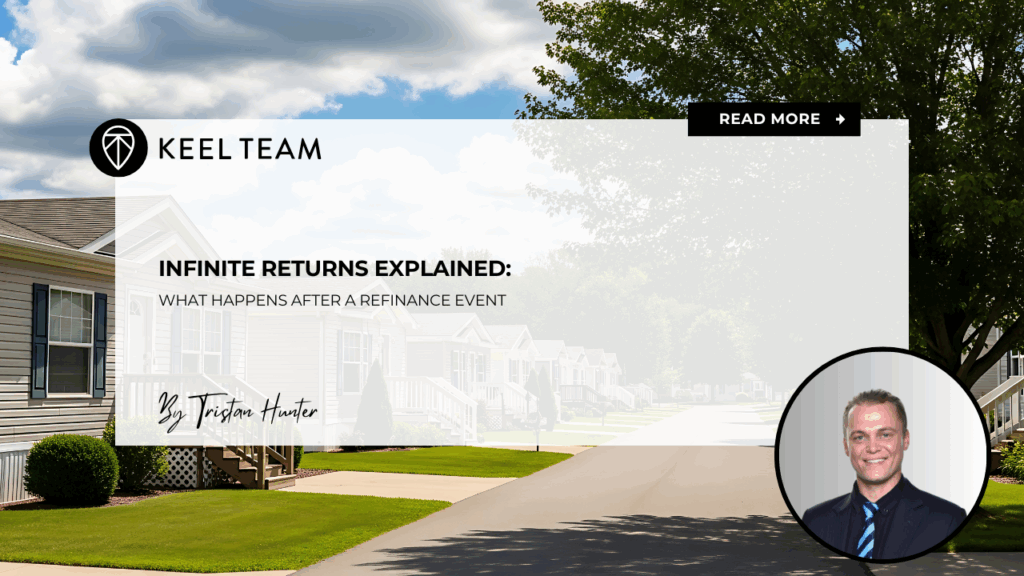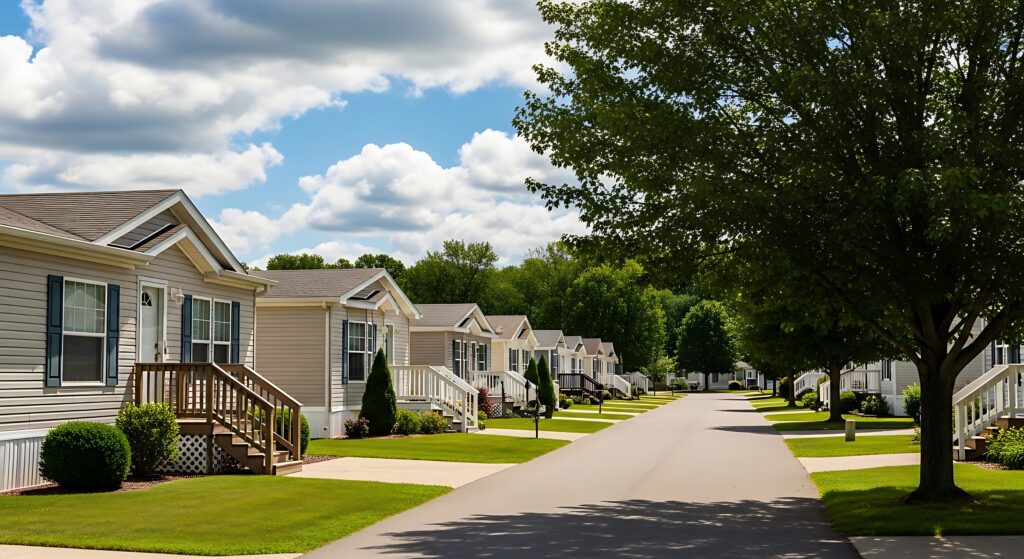Infinite Returns Explained: What Happens After a Refinance Event
-
 Tristan Hunter - Investor Relations
Tristan Hunter - Investor Relations

Passive investors in mobile home parks often hear the term “infinite returns”. This concept can sound too good to be true — after all, how can an investment have an infinite return? The phrase “infinite returns” is simply a term used in real estate to describe what happens when an investor has received back all of their original capital but continues to earn cash flow. It doesn’t mean you will actually receive infinite returns— how this plays out depends on the property’s performance, the operator’s execution, financing terms, and market conditions.
Let’s break down what “infinite returns” mean, how refinancing works, and what typically happens after a refinance in a mobile home park investment.
Understanding the Infinite Return Concept
What “Infinite Returns” Really Mean
The idea of an infinite return is simple: once investors receive their initial capital back, any further cash flow they receive is technically a return on zero invested capital. Because ROI is calculated as profit ÷ original investment, if the original investment has been fully returned, the denominator becomes zero — which mathematically creates an “infinite” return.
Why It Matters for Passive Investors
Many passive investors look for opportunities to not only receive ongoing distributions but also recycle their capital into new deals. A refinance event may allow them to pull out their original investment while still participating in future profits, creating a scenario where they are effectively playing with “house money.”
Download our FREE eBook on the Top 20 things to know BEFORE investing in mobile home parks!
How Refinancing Works in a Mobile Home Park Investment
Step 1: Property Stabilization
Typically, a mobile home park is purchased with a value-add business plan. The operator may focus on improving infrastructure, raising occupancy, installing water submeters, or addressing deferred maintenance. Over time, these improvements can increase net operating income (NOI), which in turn raises the property’s appraised value.
Step 2: Seeking a New Loan
Once the property is stabilized — meaning occupancy and income are more consistent — the operator may work with a lender to refinance the property. The new loan is often larger than the original loan because the property is now worth more.
Step 3: Returning Capital to Investors
After paying off the original loan, the difference (or “cash-out proceeds”) can be distributed to investors. These funds often represent a partial or full return of the initial equity investment.
What Happens After a Refinance
1. Capital Returned to Investors
The most notable event after a refinance is that investors get their capital back — either fully or partially. If 100% of the capital is returned, investors still hold equity in the mobile home park but no longer have their own money tied up in the deal.
2. Ongoing Quarterly or Monthly Distributions
Even after the refinance, the mobile home park continues to generate cash flow. Investors usually keep receiving distributions according to the deal’s waterfall structure. Since their capital is no longer at risk, these distributions feel even more attractive.
3. Potential Tax Advantages
In many cases, investors still receive depreciation and other tax benefits after the refinance. Because they remain equity holders, they share in any future profits and potential capital gains when the property is eventually sold.
4. Future Sale or Second Refinance
Some operators may hold the property for many more years, while others may plan to sell after a certain period. Either way, investors typically share in the upside. In some cases, a second refinance may be possible if property values continue to increase.
Common Benefits of “Infinite Returns”
Allows Capital Recycling
One of the most appealing aspects of this model is that it frees up investor capital. Instead of waiting until the property is sold to reinvest, investors can deploy their returned capital into new opportunities while still benefiting from the current deal.
Creates a Compounding Effect
Because investors can now invest in multiple deals with the same dollars, the effect can be powerful over time. This compounding potential is what makes the infinite return model so attractive to many passive investors.
Reduces Risk Exposure
Once capital is returned, the downside risk may be lower for the investor. While no investment is ever risk-free, having no principal left in the deal means future distributions could be viewed as “bonus” income.

Risks and Considerations
Debt Service May Increase
A refinance typically involves taking on new debt. If interest rates rise or if the new loan is larger, monthly debt payments may increase. This can reduce the amount of cash flow available for distribution.
Market Conditions Matter
Property values can fluctuate with market conditions. If cap rates expand or occupancy drops, refinancing might not be possible at favorable terms.
Tax Implications
While cash-out proceeds are often tax-free because they are considered a return of capital, investors should always consult their CPA to understand the specific tax treatment for their situation.
Not Always 100% Return
In some refinances, only part of the capital is returned. This still improves ROI, but it may not create a true “infinite return” scenario until the remaining capital is eventually paid back.
A Hypothetical Example
Consider a mobile home park purchased for $5 million with $2 million in investor equity and $3 million in debt. After three years of operational improvements, the property is appraised at $7 million. The operator refinances with a new $4.9 million loan, pays off the original $3 million loan, and returns $1.9 million to investors.
Investors now have only $100,000 of their original $2 million still tied up in the deal but continue receiving the same percentage of ownership and quarterly distributions. If they receive that last $100,000 through future cash flow, they have officially reached the “infinite return” threshold.
Key Takeaways for Passive Investors
- A refinance can be a powerful wealth-building tool when executed correctly.
- The infinite return model is attractive because it allows investors to keep equity while recovering their original capital.
- Passive investors should review the business plan carefully and understand how debt levels, interest rates, and market conditions might affect future returns.
- No results are guaranteed, and every mobile home park investment carries risk.
Final Thoughts
The infinite return model is one of the most compelling aspects of investing passively in mobile home parks. By returning investor capital while continuing to provide cash flow and potential appreciation, this strategy can help create powerful compounding effects over time.
However, it is important to remember that results vary depending on market conditions, operator execution, and lender terms. Passive investors are encouraged to ask questions, read the private placement memorandum carefully, and consult with their financial advisor or CPA before making any investment decisions.
Are you looking for MORE information? Book a 1-on-1 consultation with Andrew Keel to discuss:
- A mobile home park deal review
- Due diligence questions
- How to raise capital from investors
- Mistakes to avoid, and more!
Disclaimer:
The information provided is for informational purposes only and is not investment advice or a guarantee of any kind. We do not guarantee profitability. Make investment decisions based on your research and consult registered financial and legal professionals. We are not registered financial or legal professionals and do not provide personalized investment recommendations.

Tristan Hunter - Investor Relations
View The Previous or Next Post
Subscribe Below 👇





